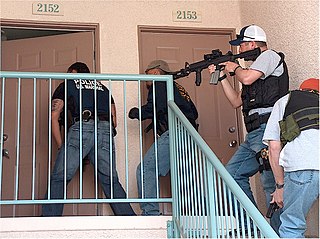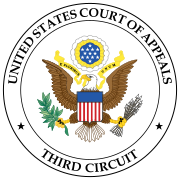
Samuel Anthony Alito Jr. is an American jurist who serves as an associate justice of the Supreme Court of the United States. He was nominated to the high court by President George W. Bush on October 31, 2005, and has served on it since January 31, 2006. After Antonin Scalia, Alito is the second Italian American justice to serve on the U.S. Supreme Court.

Edith Brown Clement is a senior United States circuit judge of the United States Court of Appeals for the Fifth Circuit, based in New Orleans, Louisiana.

Knock-and-announce, in United States law criminal procedure, is an ancient common law principle, incorporated into the Fourth Amendment, which requires law enforcement officers to announce their presence and provide residents with an opportunity to open the door prior to a search.
United States v. Grubbs, 547 U.S. 90 (2006), was a case decided by the Supreme Court of the United States involving the constitutionality of "anticipatory" search warrants under the Fourth Amendment to the United States Constitution. The Court ruled that such warrants, which are issued in advance of a "triggering condition" that makes them executable, are constitutional and do not need to describe that condition on their face.
Garcetti v. Ceballos, 547 U.S. 410 (2006), is a U.S. Supreme Court decision involving First Amendment free speech protections for government employees. The plaintiff in the case was a district attorney who claimed that he had been passed up for a promotion for criticizing the legitimacy of a warrant. The Court ruled, in a 5–4 decision, that because his statements were made pursuant to his position as a public employee, rather than as a private citizen, his speech had no First Amendment protection.

Kim Anita McLane Wardlaw is an American lawyer and jurist serving as a United States circuit judge of the United States Court of Appeals for the Ninth Circuit since 1998. She is the first Hispanic American woman to be appointed to a federal appeals court. Wardlaw was considered as a possible candidate to be nominated by Barack Obama to the Supreme Court of the United States.
Zurcher v. Stanford Daily, 436 U.S. 547 (1978), is a United States Supreme Court case from 1978 in which The Stanford Daily, a student newspaper at Stanford University, was searched by police who had suspected the paper to be in possession of photographs of a demonstration that took place at the university's hospital in April 1971. The Stanford Daily filed a suit claiming that under the protection of the First and Fourth Amendments of the Constitution, the warrants were unconstitutional and that the searches should have fallen under the context of subpoenas. The Supreme Court ruled against The Stanford Daily; however, Congress later passed the Privacy Protection Act of 1980, which provides additional protections against searches and seizures to the press and individuals who disseminate information to the public, unless the individual is suspected of a crime or a life-threatening situation is present.
Pearson v. Callahan, 555 U.S. 223 (2009), was a case decided by the United States Supreme Court dealing with the doctrine of qualified immunity.
Safford Unified School District v. Redding, 557 U.S. 364 (2009), was a case in which the Supreme Court of the United States held that a strip search of a middle school student by school officials violated the Fourth Amendment to the U.S. Constitution, which prohibits unreasonable searches and seizures.
United States v. Knotts, 460 U.S. 276 (1983), was a United States Supreme Court case regarding the use of an electronic surveillance device. The defendants argued that the use of this device was a Fourth Amendment violation. The device in question was described as a beeper that could only be tracked from a short distance. During a single trip, officers followed a car containing the beeper, relying on beeper signal to determine the car's final destination. The Court unanimously held that since the use of such a device did not violate a legitimate expectation of privacy there was no search and seizure and thus the use was allowed without a warrant. It reasoned that a person traveling in public has no expectation of privacy in one's movements. Since there was no search and seizure there was not a Fourth Amendment violation.
Kentucky v. King, 563 U.S. 452 (2011), was a decision by the US Supreme Court, which held that warrantless searches conducted in police-created exigent circumstances do not violate the Fourth Amendment as long as the police did not create the exigency by violating or threatening to violate the Fourth Amendment.
United States v. Jones, 565 U.S. 400 (2012), was a landmark United States Supreme Court case in which the court held that installing a Global Positioning System (GPS) tracking device on a vehicle and using the device to monitor the vehicle's movements constitutes a search under the Fourth Amendment.
Florence v. Board of Chosen Freeholders, 566 U.S. 318 (2012), was a United States Supreme Court case in which the Court held that officials may strip-search individuals who have been arrested for any crime before admitting the individuals to jail, even if there is no reason to suspect that the individual is carrying contraband.
Bailey v. United States, 568 U.S. 186 (2013), was a United States Supreme Court case concerning search and seizure. A 6–3 decision reversed the weapons conviction of a Long Island man who had been detained when police followed his vehicle after he left his apartment just before it was to be searched. Justice Anthony Kennedy wrote the majority opinion, and Antonin Scalia filed a concurrence. Stephen Breyer dissented.

Florida v. Jardines, 569 U.S. 1 (2013), was a United States Supreme Court case which resulted in the decision that police use of a trained detection dog to sniff for narcotics on the front porch of a private home is a "search" within the meaning of the Fourth Amendment to the United States Constitution, and therefore, without consent, requires both probable cause and a search warrant.
Riley v. California, 573 U.S. 373 (2014), is a landmark United States Supreme Court case in which the court ruled that the warrantless search and seizure of the digital contents of a cell phone during an arrest is unconstitutional under the Fourth Amendment.
Rodriguez v. United States, 575 U.S. 348 (2015), was a United States Supreme Court case which analyzed whether police officers may extend the length of a traffic stop to conduct a search with a trained detection dog. In a 6–3 opinion, the Court held that officers may not extend the length of a traffic stop to conduct a dog sniff unrelated to the original purpose of the stop. However, the Court remanded the case to the United States Court of Appeals for the Eighth Circuit to determine whether the officer's extension of the traffic stop was independently justified by reasonable suspicion. Some analysts have suggested that the Court's decision to limit police authority was influenced by ongoing protests in Ferguson, Missouri.
Utah v. Strieff, 579 U.S. 232, 136 S. Ct. 2056 (2016), was a case in which the Supreme Court of the United States limited the scope of the Fourth Amendment's exclusionary rule.
Plumhoff v. Rickard, 572 U.S. 765 (2014), is a United States Supreme Court case involving the use of force by police officers during high-speed car chases. After first holding that it had jurisdiction to hear the case, the Court held that the conduct of the police officers involved in the case did not violate the Fourth Amendment to the U.S. Constitution, which prohibits unreasonable searches and seizures.
Caniglia v. Strom, 593 U.S. ___ (2021), was a United States Supreme Court case related to the Fourth Amendment to the United States Constitution's "community caretaking" exception.





